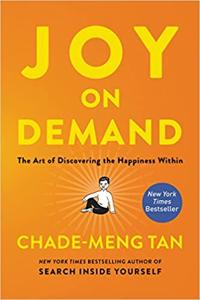
Want to learn the ideas in Joy On Demand better than ever? Read the world’s #1 book summary of Joy On Demand by Chade-Meng Tan here.
Read a brief 1-Page Summary or watch video summaries curated by our expert team. Note: this book guide is not affiliated with or endorsed by the publisher or author, and we always encourage you to purchase and read the full book.
Video Summaries of Joy On Demand
We’ve scoured the Internet for the very best videos on Joy On Demand, from high-quality videos summaries to interviews or commentary by Chade-Meng Tan.
1-Page Summary of Joy On Demand
Overview
It’s not easy to tell if you’re a happy person, but you can be. You don’t need money or expensive things to do it.
Meditation can help you manage stress and improve your performance, but it’s even more powerful than that. In fact, it can also make you happier in the long run.
A lot of adults feel the same as they did when they were teenagers. You need to discover what makes you happy, and how your happiness can improve by loving strangers.
Big Idea #1: A person’s level of happiness tends to remain static unless improved through regular meditation practice.
There was once a man who went to see a palm reader. The palm reader looked at the man’s hands and told him he would be miserable until he turned forty. However, this was not what the man had expected; instead of being upset that he would continue to be unhappy for another decade, the man interpreted it as meaning that by turning forty, his misery would finally end. Unfortunately, he misinterpreted—the palm reader meant that after turning forty, the man would simply become used to his misery rather than becoming happy again.
Most people are happy with their lives. This is evident in the example above, and studies have shown that humans adapt quickly to both positive and negative situations.
A study in 1978 by psychologist Philip Brickman found that winning the lottery or being paralyzed doesn’t affect a person’s happiness. A 1996 study of twins done by David Lykken concluded that 50 percent of our ability to remain happy is genetic, and only 3 percent comes from external factors like money and education.
The author is saying that if a person was born unhappy, she has to deal with it. However, the truth is that you can work on your mental strengths and become happier.
In fact, just as working out can make one’s body stronger, mental exercises can increase one’s happiness. The author made this discovery when he began meditating and found that it was like doing sit-ups for the mind.
What makes meditation so helpful? It’s because when you meditate, you strengthen your mind and it becomes better at achieving certain results. For example, if you want to become happier, then the more you meditate, the more likely that will happen. However, this requires a commitment to regular meditation which can be difficult for some people. But in the following points I’ll explain why it’s worth it and what benefits come from doing your own practice of meditation:
Big Idea #2: Meditation has much to offer, from a renewed sense of calm to the development of emotional strength.
If you’ve ever exercised, you know how hard it can be to get started and how great it feels once you’re doing it. The same goes for meditation. To start meditating is difficult, but the benefits are worth it. With practice, we can learn to calm our minds during meditation just as we would with exercise—it takes time and patience!
Meditation can help you become more disciplined and emotionally resilient. For example, one of the author’s students learned to stop making snide remarks to his in-laws after meditating for a few weeks. He also became more emotionally resilient when he faced setbacks like getting fired from work. Meditating will give you emotional resilience by teaching you how to calm your mind during times of distress.
You’ll be able to befriend your emotions, accepting them for what they are. Once you do this, your emotions won’t pull you around as much and you’ll be free to consider constructive next steps like finding another job or changing careers.
Meditation has many benefits. It can help you achieve peace of mind, reduce anxiety and depression, boost your immune system, and more. But how long will it take to experience them? We’ll find out in the next section.






